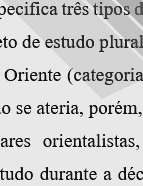

In this way, the definitions of orientalism presented here suggest the disciplinarization of a field of study (Rabault-Feuerhahn, “‘La science la robe au vent’”, 2012) – Oriental studies – that was trying to organize itself and develop at the end of the nineteenth century. This disciplinarization accompanied the rise of a specific discourse and imaginary concerning the ‘oriental’ Other, and left little doubt about the profile of those with the capacity and legitimacy to study and talk about this figure: either Europeans who had specialized in the subject (Idem, p. 2) or lived in the Orient for a long period of time, or ‘orientals’ educated and/or settled in the West.
Outside of Portugal, especially in England, France, Germany, Italy and even Spain, Oriental studies prospered thanks to a range of initiatives that supported the professionalization of those engaged in this kind of study. The creation of spaces of intellectual sociability and scientific debate, such as the International Congresses of Orientalists, is one symptom of these efforts. These congresses were organized fairly regularly over a period of 100 years, from 1873 to 1973, totalling 29 official editions (not including the 1891 event held in London, since designated as a statutory congress, or the ill-fated Lisbon edition, which was scheduled for 1892 but ultimately did not take place) and were attended by Portuguese orientalists, albeit sporadically and in small numbers. Nonetheless, these meetings provided opportunities to establish and consolidate contact and collaboration networks through which Portuguese orientalists were able to keep pace with advances being made in the field outside of Portugal, with some even managing to export their own scientific research. Francisco Maria Esteves Pereira is one such case, who had a number of his studies featured in French- and German- language periodicals. Following the London Congress of Orientalists of 1892, which put an end to a schism which had split the international orientalist community since at least 1889, these meetings would be increasingly dominated by qualified, or so-called professional orientalists with an established academic and/or scientific career. Speaking of the congresses, Filipa Vicente points out that “they place the ‘oriental’ denomination above the geographical specificity which distinguished them, thus contributing to consolidate the profession of ‘orientalist,’ which carried as heterogeneous a meaning as the very ‘Orient’ being studied” (Outros Orientalismos, 2009, pp. 75-76). One of the most obvious driving forces behind this professionalization was the establishment of specialized schools, university chairs and curricula throughout Europe from the end of the eighteenth century. Paris’ École Nationale (or Spéciale) des Langues Orientales Vivantes (founded in 1795) is one example of this movement, as are the German universities of Berlin and Munich which, from the 1830s onwards, amassed an attractively sizeable academic staff specialized in Oriental studies. Guilherme de Vasconcelos Abreu and David Lopes offer examples of two distinct scientific careers which benefitted from this movement towards orientalist specialization.
